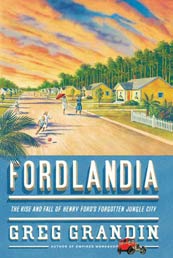Each day leading up to the March 11 announcement of the 2009 NBCC award winners,  Critical Mass highlights one of the thirty finalists. Today, NBCC board member Art Winslow discusses nonfiction finalist Greg Grandin's Fordlandia: The Rise and Fall of Henry Ford's Forgotten Jungle City (Metropolitan Books)
Critical Mass highlights one of the thirty finalists. Today, NBCC board member Art Winslow discusses nonfiction finalist Greg Grandin's Fordlandia: The Rise and Fall of Henry Ford's Forgotten Jungle City (Metropolitan Books)
By 1921, Henry Ford’s company had a lock on more than half the U.S. automobile market, turning out 2 million Model Ts a year, with a cost of production 60% lower than it had a decade beforehand. This was not the “race to the bottom” of today’s globalism, searching for the cheapest possible labor, either, for when Ford announced he would pay workers an incentive $5 dollars a day, it was twice the industry standard of the time. It was not the production line per se but the close and careful choreographing of multiple processes simultaneously that allowed for the industrial efficiency, the approach that came to be known as “Fordism,” as Greg Grandin explains in Fordlandia.
Grandin’s book is an account of a Ford project little known today, the establishment of a rubber plantation on a tributary of the Amazon in the Brazilian jungle, but along the way it also presents a lucid and nuanced analysis of the contradictions built into Ford’s brand of paternalized capitalism. Even as he catalogues its failures, Grandin notes that Ford’s impulses toward social engineering “compare well with what is available in much of the world today.”
Over the course of nearly two decades, Henry Ford pumped tens of millions of dollars into funding two American towns in Brazil, “complete with central squares, sidewalks, indoor plumbing, hospitals, manicured lawns, movie theaters, swimming pools, golf courses, and of course Model Ts and As rolling down their paved streets,” Grandin writes. (Ford, born on a farm in Michigan, hated cows; today one of those golf courses is grazeland for cattle.)
The major purchase of Brazilian property, on the shore of the Tapajos River, was roughly sketched out by two employees Ford sent there in 1927, who drew a line on the map encompassing 5,625 square miles. The state of Para ended up ceding Ford slightly less, but the nearly 2.5 million-acre swath was about the size of Connecticut, and the half that represented public land was given to Ford free, the government was so eager for development in its backwater regions.
Ford understood “that high wages and decent benefits would do more than create a dependable and thus more productive workforce; they would also stabilize and stimulate demand for industrial products by turning workers into consumers.” In an ideal sense Ford was an admirer of Emerson, and he pictured in his methods a kind of holism that Grandin interprets as “an American pastoralism that didn’t oppose nature and industrialization, or man and the machine, but saw each fulfilling the other. “ Yet “both his car and his factory system worked against the world he hoped to bring into being,” Grandin asserts.
The eccentricities and worse of the man—Ford’s anti-Semitism, for example—are well explored by Grandin, who rounds out his chronicle of hubris and steady slippage in the Amazon (including uprisings by the workers) with accounts of Ford’s penchant for attempting to create self-sustaining village industries and planned communities, several of those in Michigan. When production of latex proved extremely problematic, Ford’s mission was then rationalized as a civilizing one. Ford hated FDR’s New Deal, but the 1930 revolution in Brazil that brought Getulio Vargas to power, propelling pro-labor, FDR-style legislation, helped him a great deal, but one of the multiple ironies in Fordlandia.
As Grandin sees it, “Born more from political frustration at home than from the need to acquire control over yet another raw material abroad, Fordlandia represents in crystalline form the utopianism that powered Fordism—and Americanism.”
Click here to read an excerpt from Fordlandia.
Click here to watch Greg Grandin discuss Fordlandia (courtesy of Democracy Now!)
The NBCC awards ceremony is free and open to the public, as are the readings by NBCC finalists on Wednesday, March 10. To purchase tickets to the reception following the awards ceremony, click here.


